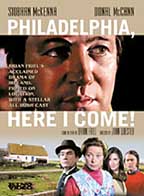FILM NOTES
FILM NOTES INDEX
NYS WRITERS INSTITUTE
HOME PAGE

Directed by John Quested
(Ireland, 1975, 95 minutes, color, DVD)
Starring:
Donald McCann……….Gar (Public)
Des Cave……….Gar (Private)
Siobhan McKenna..........Madge
The
following film notes were prepared for the New York State Writers
Institute by Kevin Jack Hagopian, Senior Lecturer in Media Studies
at Pennsylvania State University:
Eli Landau's quixotic American Film Theater experiment in the early 1970's brought plays of proven significance to the screen. The filmed version of Eugene O'Neill's The Iceman Cometh, for instance, honored a sacred text of the American theater, and Chekov's Three Sisters was one of the series' most critically successful works. But AFT also helped to canonize recent plays, placing them on the shelf next to recognized masterworks like O'Neill's and Chekov's. Brian Friel's modern Irish dream play Philadelphia, Here I Come had opened in New York in 1966. By circulating Friel's moody, surreally fretful vision to theaters throughout the U.S., AFT helped to make a genuinely unusual play a staple of American theater.
Philadelphia, Here I Come blends the surreal into the mundane. Gar, a young Irishman, stands on the brink of a journey to America, leaving behind family and friends. Philadelphia, Here I Come is Gar's long goodbye to a landscape haunted by memory, laughter, and blood. Gar's view of the U.S. is forever colored by the picture of the smaller, even intimate scale of the life he is leaving behind; like Jim Sheridan's In America, a film that honors Philadelphia, Here I Come, this is a film that shows the Irish in America as perpetually emigrants and immigrants.
Gar, like most of us, is two people, and the disputes between those two people generate much of the energy by which he lives his life. But just as Gar is a man divided by his roots in Ireland and his ambitions to make it in the states, so Philadelphia, Here I Come divides Gar on stage. Private Gar is played by Des Cave, and public Gar by Donal McCann. Friel's determination to make the metaphysical physical has maddened many a critic, and some of the film's reviewers simply lost patience with a device that seemed to them to work better on stage than in films. But those grumpy critics had obviously forgotten Luis Bunuel's That Obscure Object of Desire, a film whose splitting of its protagonist is very similar to Philadelphia, Here I Come. They'd hailed the Bunuel film as a stroke of experimental genius.
Gar's schizophrenia is pitched in a low key. Outwardly happy to put the threadbare economics of Ireland and the weight of ancestral resentments behind him, inwardly, he's not so sure. He's poor, his girl has married another boy, and his father treats him like dirt. But in the very moment of his leaving, an inner voice speaks up, and makes Gar wonder if all this is the fault of Ireland, or if he'll export his phobias with him to Philadelphia.
Actor Donal McCann, as public Gar, is expansive and confident, reassuring others about his trip even as the private Gar whispers in his ear, a psychological tumor, a perverse voice, not so much of conscience, as of baroque self-doubt, an anti-therapist glued to Gar's shoulder. McCann died too young, and his performance here is rightly viewed as the kind of epitaph an actor might write for himself -- wordy, emotionally multivalent, and finally a test not only of technical acting skill, but of the ability of the actor to reveal the two selves we all carry around with us.
The film was an outlet for AFT. Produced in Ireland, outside of the usual channels for AFT productions, Landau picked the film up for distribution to fill out his schedule. His eye was acute, though, for though Friel made substantial cuts, and some additions and openings-up in adapting his play to the screen, this film obeys the AFT mission to transfer the essence of drama as intact as possible to the film screen. Friel's plays, such as Dancing at Lughnasa and Volunteers have explored the collision between the romantic mythology of Ireland and the ordinary lives of its modern citizens. In that dark green space, Friel's characters discover themselves. Friel, a prolific recluse, has become one of Ireland's most beloved literary sons. Philadelphia, Here I Come is perhaps his anchor text, the work that best lays out in schematic form the divisions and unities of Brian Friel's Irish self.
— Kevin Hagopian, Penn State University
For additional information, contact the Writers Institute at 518-442-5620 or online at https://www.albany.edu/writers-inst.
 Philadelphia, Here I Come
Philadelphia, Here I Come